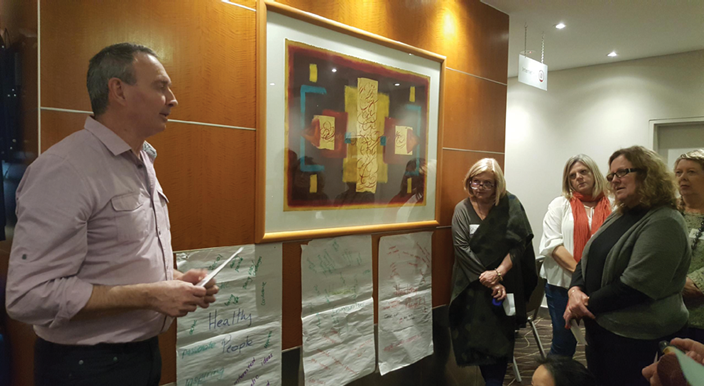
How do you think about sustainability? Do you have a coherent understanding of what it means to live sustainably? And, as educators, to teach this concept?
The Protecting Our Planet (POP) Sustainability workshops at the IEUA NSW/ACT Branch’s Early Childhood Education Conference on 8 September explored these matters and looked at learning resources for early childhood centres and parents.
Sutherland Shire Council Children’s Services won a NSW Environmental Trust grant to develop materials that engaged educators, children and families in sustainability. Developed with parents and educators, the POP project comprises over 300 education resources available for loan to families, training, events and social media initiatives.
The POP resources proved as useful for the parents as they did for the children. The evaluation showed that the materials were starting points for numerous games and activities such as composting, gardening, healthy eating, avoiding waste and recycling.
One parent said “the kit of resources helped because it provided another strategy to talk about good food in a non threatening way”. Another parent said “the games about vegetables made a big difference to my son’s eating habits”.
A teacher at one centre said “the POP kits help us embed sustainability into the curriculum – through practical, fun and hands on activities. The items are directly relevant and applicable to the students’ lives; they are age appropriate and they help make the connection to living in caring, healthy and sustainable ways”. Another staff member said the resources provoked a powerful question from one of the students: “Why should I protect nature”?
Examples of the POP resources were available at the conference workshops and participants selected an item that would be popular at their centre. Participants were also asked four questions: concerns for the future, priorities for their children at the centre, values, and a word/idea that should be included in a definition of sustainability.
Participants talked with others about their answers and the resources they had selected, before moving into groups where they were given butchers paper to record key sustainability ideas linked to health. Each group considered a different aspect: people, communities, planet.
Finally, the ideas were pulled together into a coherent understanding of sustainability. Participants were asked to identify commonalities across the various elements; they were also asked to link their own answers from the opening activity and the selected POP item to this scribbled map of sustainability.
The point of the activity wasn’t to develop a definition of sustainability. Instead, it was to encourage participants to develop an agreed understanding of sustainability back at their centres – and to develop it with the children and the parents. All agreed our workshop activities could be used at their centres.
It is our contention that, without a thought out and agreed definition of sustainability at a school or centre, incoherence and confusion about this important concept are taught. Without an agreed understanding, teachers would be missing great opportunities to see where their resources and day-to-day activities fit in helping people create a sustainable world.
Phil Smith, sustainability education consultant and Deborah Long, Quality Practice Manager, Children’s Services, Sutherland Shire Council
The POP resources are available for loan. Contact Deborah at SSC: vdlong@ssc.nsw.gov.au







































































































































